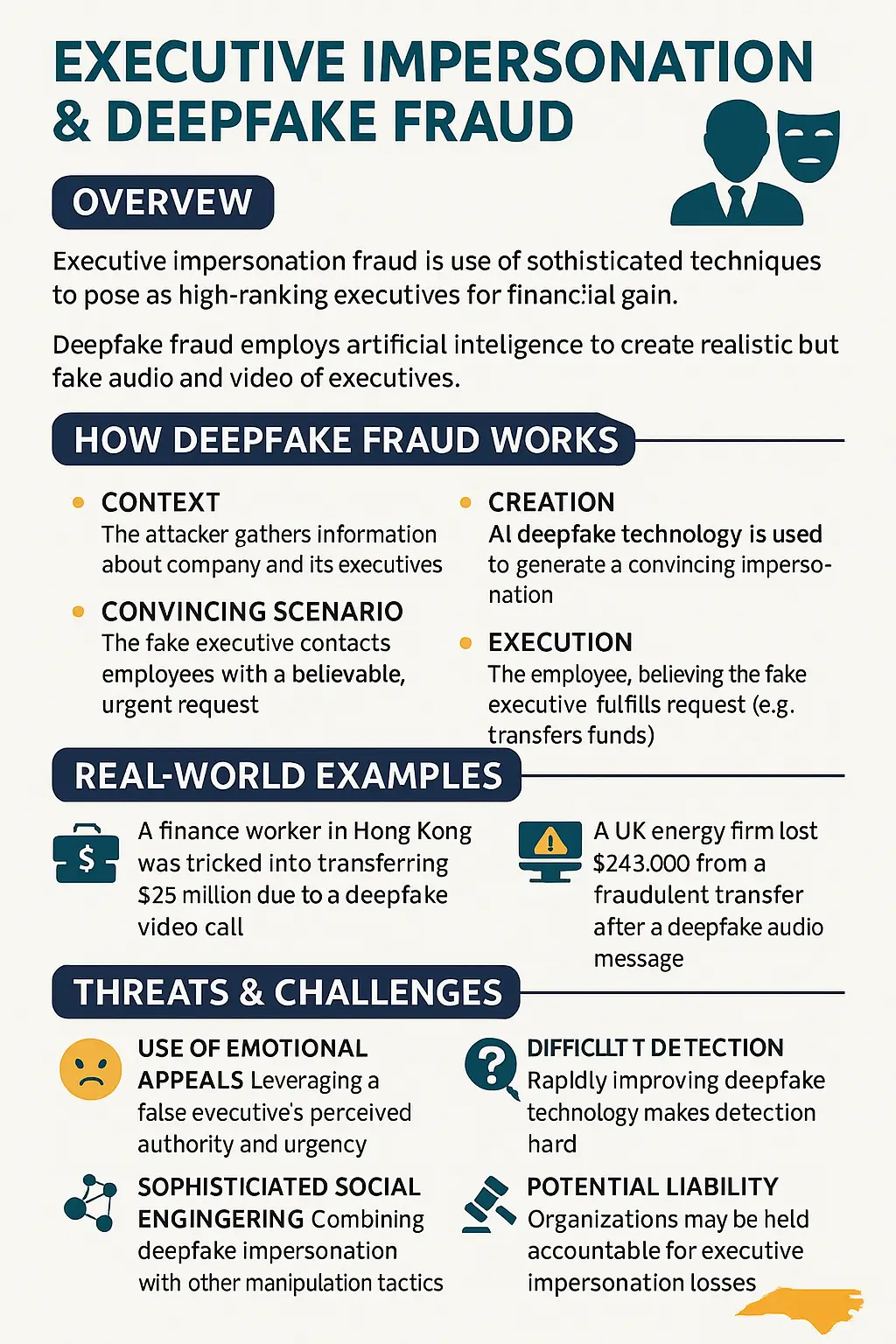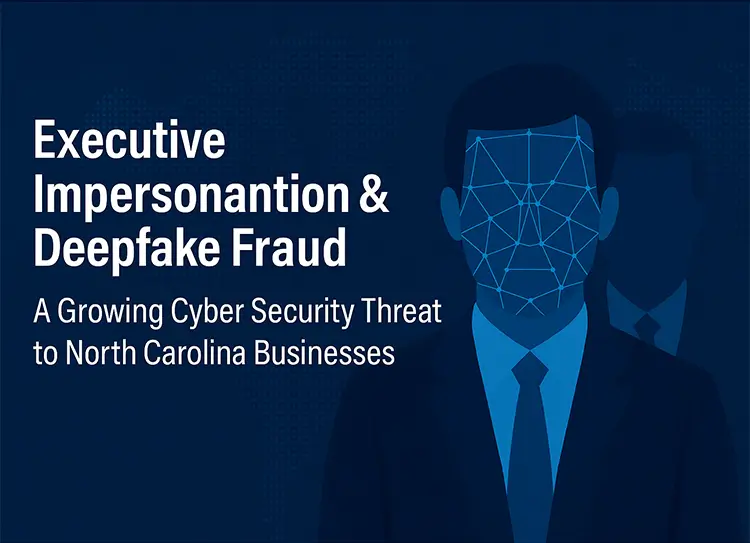Executive Impersonation & Deepfake Fraud: A Growing Cyber Security Threat for North Carolina Businesses
North Carolina is a hub of innovation, growth, and opportunity. From Charlotte’s banking giants to the Research Triangle’s biotech and software companies, the state is home to industries that power not only the local economy but also play a critical role nationally. However, with opportunity comes risk. A new wave of cybercrime is emerging—one that leverages artificial intelligence (AI) to create deepfake fraud and executive impersonation attacks.
These scams are no longer the stuff of science fiction. They are here, now, targeting businesses of all sizes across the United States and increasingly in North Carolina. The FBI has already warned about a sharp rise in CEO fraud and AI-driven impersonation attacks. For organizations that haven’t yet reviewed their cyber security policies, this could spell disaster.
This blog will explore:
- What executive impersonation and deepfake fraud are
- Why they pose a unique threat to businesses in North Carolina
- Real-world case studies and lessons learned
- The regulatory and legal obligations specific to NC
- How IT Support, Managed IT Services, and strong cyber security strategies can help mitigate these threats
By the end, you’ll have a roadmap to help protect your organization against one of the most advanced forms of cybercrime.

What Is Deepfake Fraud and Executive Impersonation?
Deepfake fraud uses AI to create highly realistic fake audio, video, or images that mimic real people. When paired with executive impersonation—where attackers pretend to be CEOs, CFOs, or senior leaders—the result can be devastating.
Imagine receiving a Teams call where your CEO appears live, requesting an urgent wire transfer. Or hearing your CFO’s voice on the phone asking you to approve a vendor payment. In reality, neither is your executive—it’s a criminal using AI-generated media to trick you into compliance.
How It Works
- Data Gathering – Attackers scrape public content (webinars, YouTube clips, LinkedIn posts).
- AI Modeling – Using voice-cloning or video synthesis tools, they create deepfake media.
- Social Engineering – Fraudsters insert the fake into emails, phone calls, or video chats.
- Exploitation – Urgent instructions are given, usually involving financial transfers or data access.
This isn’t hypothetical. Businesses worldwide have already lost millions to such scams. And because North Carolina is home to high-value industries like finance, healthcare, technology, and manufacturing, the state is firmly in the crosshairs.
Why North Carolina Businesses Are High-Value Targets
- Charlotte: America’s Banking Capital
Charlotte ranks as the second-largest banking hub in the U.S. after New York. With institutions like Bank of America and Truist headquartered here, along with countless regional banks and credit unions, criminals view the region as a goldmine. Deepfake impersonation of financial executives can lead to fraudulent wire transfers or data breaches with enormous consequences.
- Research Triangle Park (RTP): Tech & Biotech Innovation
Raleigh, Durham, and Chapel Hill form one of the largest research parks in the world. Biotech startups, software companies, and research universities attract global investment. Intellectual property here is extremely valuable. Deepfake fraud targeting CEOs or lead scientists could result in stolen trade secrets or leaked R&D data.
- Healthcare Systems
North Carolina boasts world-renowned hospitals and research centers, such as Duke Health and UNC Health. Cybercriminals may impersonate doctors or administrators, leveraging deepfakes to request sensitive patient data—exposing organizations to HIPAA and state law violations.
- Manufacturing & Agriculture
From Greensboro’s manufacturing plants to the state’s agribusiness sector, attackers can use executive impersonation to disrupt supply chains, redirect vendor payments, or extort sensitive contracts.
Real-World Case Studies
Global Examples With Lessons for NC
- UK Energy Company – Scammed out of $243,000 after a CEO’s voice was cloned and used to request an urgent transfer.
- Tech Firm (U.S.) – Lost $2.3 million in an AI-powered phishing attack when an employee was tricked by a fake voice message from the CEO.
- WPP (UK) – The world’s largest ad agency narrowly avoided fraud when scammers used a fake video of the CEO.
Hypothetical North Carolina Scenario
A Raleigh-based biotech startup receives a video call from their “CEO,” instructing the finance manager to wire $750,000 to close an urgent acquisition. The deepfake is convincing—the voice, mannerisms, and urgency all match. Without verification protocols, the funds are gone before anyone realizes the fraud.
The Legal & Regulatory Landscape in North Carolina
North Carolina has some of the strictest state-level data protection laws in the country. Failure to prevent or respond to deepfake fraud can lead to financial, legal, and reputational consequences.
- NC Identity Theft Protection Act (NCITPA) – Requires notification of affected parties and the Attorney General if personal data is compromised.
- NC General Statute §75-65 – Imposes civil penalties of up to $5,000 per violation for failure to disclose breaches.
- HIPAA & PCI DSS – Apply to healthcare and financial institutions respectively, with additional penalties.
- NCDIT Cybersecurity Division – Provides guidance and expects compliance with state cyber security best practices.
For organizations in Charlotte, RTP, or statewide, non-compliance could mean millions in penalties on top of fraud losses.
Why Deepfake Fraud Is Hard to Detect
Deepfake technology is advancing faster than detection methods. Some reasons it is especially dangerous include:
- High Believability – Synthetic voices or videos are indistinguishable from real ones to the human ear.
- Exploitation of Authority – Employees hesitate to question executives.
- Use of Trusted Channels – Deepfakes are delivered via Zoom, Teams, or corporate email accounts.
- Speed of Execution – Wire transfers or data leaks can occur within minutes.
Building a Defense Strategy
- Policy & Governance
- Require two-factor verification for financial requests.
- Set limits on who can authorize wire transfers.
- Document clear protocols for reporting suspicious communications.
- Employee Training
- Train finance and HR teams to spot red flags like urgent, secretive requests.
- Conduct regular phishing and deepfake simulation exercises.
- Encourage a “trust but verify” culture—even when the request seems to come from the CEO.
- Technology Investments
- Deploy deepfake detection software integrated into conferencing tools.
- Use multi-factor authentication (MFA) across all systems.
- Monitor for anomalies with AI-driven security tools provided by managed IT services.
- Managed IT Services & Local Partnerships
Partnering with North Carolina–based IT Support and Managed IT Services providers ensures your defenses are tailored to the state’s legal environment and industry needs. These providers can:
- Conduct cyber security audits specific to NC compliance.
- Provide 24/7 monitoring for unusual financial or login activity.
- Integrate incident response playbooks aligned with NC breach laws.
Local Resources for NC Businesses
- North Carolina Department of Information Technology (NCDIT) – Guidance on state cyber security standards.
- NC Chamber of Commerce – Offers workshops on cyber threats.
- UNC Chapel Hill & NC State University – Research into AI, fraud detection, and cyber security.
- Attorney General’s Office – Resource for compliance and breach notification procedures.
Practical Action Plan for NC Businesses
- Audit Your Risk – Identify executives most likely to be impersonated.
- Update Policies – Ensure high-value transactions require multi-channel verification.
- Train Employees – Especially finance and HR.
- Engage IT Services – Use local managed IT services for monitoring and compliance.
- Simulate Attacks – Test staff response with realistic scenarios.
- Prepare for Regulation – Stay aligned with NCITPA and federal laws.
Conclusion
North Carolina’s business community is thriving, but that success makes it a target. Deepfake fraud and executive impersonation are not distant threats—they are here now.
The good news is that businesses can protect themselves with a layered defense strategy:
- Strong policies and governance
- Employee awareness and training
- Advanced detection tools
- Partnerships with trusted IT Support and Managed IT Services providers
By acting today, North Carolina businesses can prevent becoming tomorrow’s headline victim of deepfake fraud.

